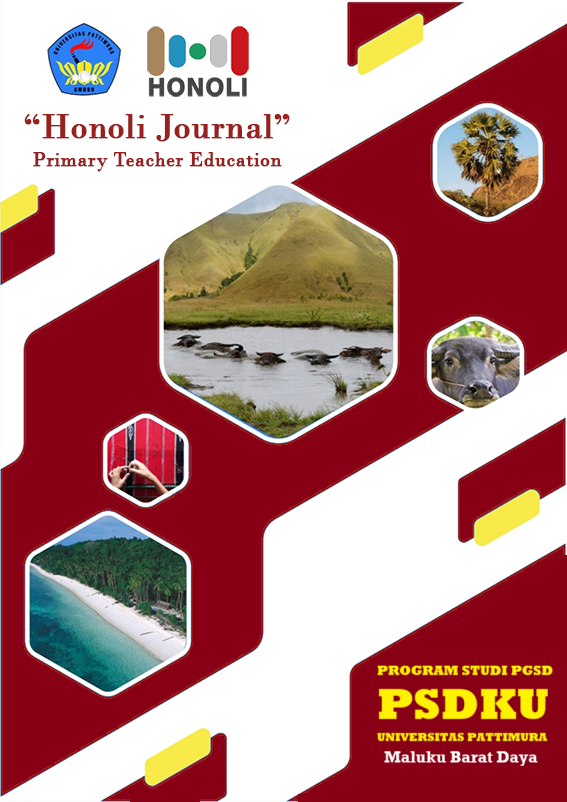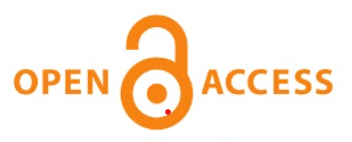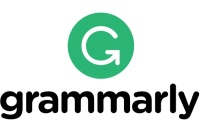Pengaruh Penerapan Model Pembelajaran Quiz-Quiz Trade Dalam Meningkatkan Keterampilan HOTS dan Hasil Belajar Siswa di SD Kristen Luhulely yang Berbasis Wilayah 3T
Abstract
Tujuan penelitian ini yaitu untuk meningkatkan keterampilan mengetahui peningkatan keterampilan HOTS (Higher Order Thinking Skills) Dan Hasil Belajar Sisw Di Kelas V SD Kristen Luhulely yang termasuk daerah 3T (Terdepan, Terpencil dan Tertinggal) dengan menerapkan model pembelajaran Quiz-Quiz Starde. Metod penelitian yang digunakan yaitu penelitian Tindakan kelas. Subjek penelitian yaitu siswa kelas V SD Kristen Luhulely yang berjumlah 52 siswa. Berdasarkan hasil tes akhir siklus II menunjukan bahwa, terjadi peningkatan hasil belajar dari tes awal menunjukan ketuntasan klasikal 12 (23.07%), pada siklus I hasil belajar siswa mengalami peningkatan 40 (76%), dan pada siklus II meningkat menjadi 100%. Selain hasil belajar adapun presentase peningkatan keterampilan HOTS (Higher Order Thinking Skills) kemampuanberpikirtingkat tinggipada siswam pada siklus I mencapai 75% akan mengalami peningkatan pada sisklus II menjadi 84,89% dengan kriteria sangat baik. Dengan demikian maka penerapan model pembelajaran Quiz-Quiz Trade dikatakan berhasil.
Downloads
References
Anderson, L. W., & Krathwohl, D. R. (Eds.). (2015). A taxonomy for learning, teaching, and assessing: A revision of Bloom's taxonomy of educational objectives. Longman.
Arends, R. I. (2012). Learning to teach (9th ed.). McGraw-Hill.
Bellanca, J., & Brandt, R. (2010). 21st century skills: Rethinking how students learn. Solution Tree Press.
Brookhart, S. M. (2010). How to assess higher-order thinking skills in your classroom. ASCD.
Bruner, J. S. (1960). The process of education. Harvard University Press.
Dufour, R., & Marzano, R. J. (2011). Leaders of learning: How district, school, and classroom leaders improve student achievement. Solution Tree Press.
Fisher, A. (2005). Critical thinking: An introduction (2nd ed.). Cambridge University Press.
Gillies, R. M. (2007). Cooperative learning: Integrating theory and practice. SAGE Publications.
Johnson, D. W., & Johnson, R. T. (1999). Learning togetherand alone: Cooperative, competitive, and individualistic learning (5th ed.). Allyn & Bacon.
Kagan, S. (2014). Kagan structures: Research and rationale. Kagan Publishing.
Kagan, S., & Kagan, M. (2009). Kagan cooperative learning. Kagan Publishing.
Kurniati, D., Harimukti, S., & Jamil, M. (2016). Tantangan pendidikan di daerah 3T: Perspektif guru dan kebijakan. Jurnal Pendidikan dan Kebudayaan, 21(2): 134–145.
Larson, L. C., & Miller, T. N. (2011). 21st century skills: Prepare students for the future. Kappa Delta Pi Record, 47(3):121–123. https://doi.org/10.1080/00228958.2011.10516575
Lie, A. (2007). Cooperative learning: Mempraktikkan cooperative learning di ruang-ruang kelas. Grasindo.
Mahajan, R. V. (2017). Role of teacher in innovative teaching. Scholarly Research Journal for Interdisciplinary Studies, 4(31): 6692–6701.
Marzano, R. J. (1998). A theory-based meta-analysis of research on instruction. Mid-continent Regional Educational Laboratory (McREL).
McTighe, J., & Wiggins, G. (2005). Understanding by design (Expanded 2nd ed.). ASCD. Nieto, S. (2010). The light in their eyes: Creating multicultural learning communities (10th anniversary ed.). Teachers College Press.
Partnership for 21st Century Skills. (2015). Framework for 21st century learning. http://www.battelleforkids.org/networks/p21
Piaget, J. (1952). The origins of intelligence in children (M. Cook, Trans.). International Universities Press.
Slavin, R. E. (2005). Cooperative learning: Theory, research, and practice (2nd ed.). Allyn & Bacon.
Tomlinson, C. A. (2001). How to differentiate instruction in mixed-ability classrooms (2nd ed.). ASCD.
Trilling, B., & Fadel, C. (2009). 21st century skills: Learning for life in our times. Jossey-Bass.
Vygotsky, L. S. (1978). Mind in society: The development of higher psychological processes. Harvard University Press.
Wagner, T. (2010). The global achievement gap: Why even our best schools don't teach the new survival skills our children need—and what we can do about it. Basic Books.
Zohar, A., & Dori, Y. J. (2003). Higher order thinking skills and low-achieving students: Are they mutually exclusive? The Journal of the Learning Sciences, 12(2), 145–181.






